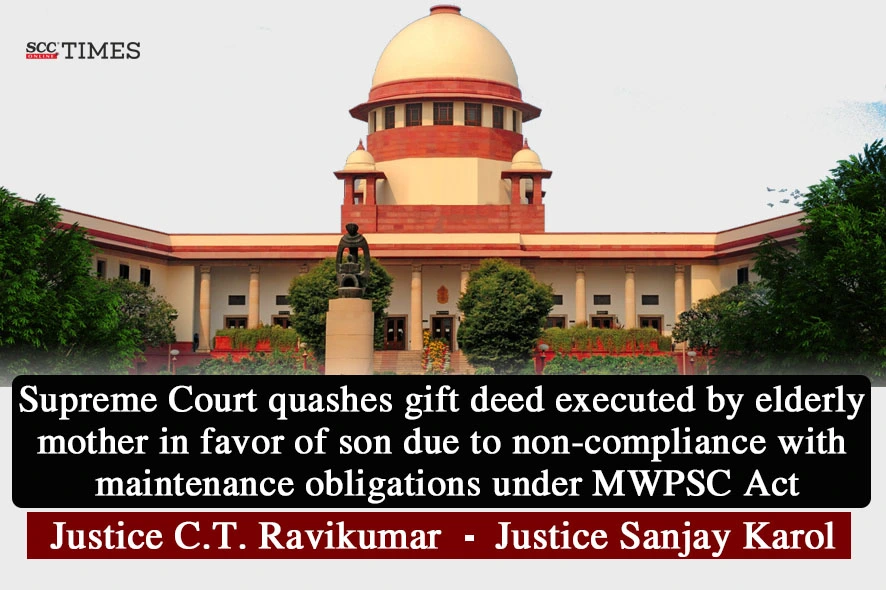Supreme Court: In an appeal filed against the judgment and order passed by Madhya Pradesh High Court, wherein the Single Judge affirmed the judgment passed by the Collector and the SDM allowing the application filed by the appellant mother under Section 23 of the Maintenance and Welfare of the Parents and Senior Citizens MWPSC Act, 2007 (‘MWPSC Act,’) seeking setting aside of Gift deed dated 09-09-2019, the division bench of C.T. Ravikumar and Sanjay Karol, JJ. set the gift deed executed by a mother in favour of her son after conditions for her maintenance were not complied with. Further, directed the possession of the premises to be restored to the appellant by 28-02-2025.
Background
The appellant, the mother of the respondent son, purchased the subject property on 23-01-1968. On 07-09-2019, she executed a Gift Deed in favor of the respondent, stating that the donee would maintain and provide for the donor, and the deed was registered on 09-09-2019. Allegedly, on the same day, the respondent executed a vachan patra (promissory note), committing to take care of the appellant for her lifetime, with a clause allowing the appellant to revoke the Gift Deed if he failed to do so. The respondent has since claimed this vachan patra to be fabricated. Following a breakdown in their relationship and allegations of harassment for further property transfers, the appellant filed an application under Sections 22 and 23 of the Maintenance and Welfare of Parents and Senior Citizens MWPSC Act, 2007, seeking to set aside the Gift Deed. The Sub-Divisional Magistrate allowed the application, declaring the Gift Deed null and void, and the decision was upheld on appeal observing that the respondents had not approached the Court with clean hands and had failed to serve their parents who are senior citizen. However, a Division Bench of the High Court later set aside these orders, ruling that Section 23 of the MWPSC Act is a standalone provision and the function of the Tribunal is only to find out whether the condition in the gift deed or otherwise contains a clause providing for basic amenities and whether the transferee has refused or failed to provide them. There is no other jurisdiction vested with the Tribunal. Thus, aggrieved, the appellant filed the present appeal.
Issue
Whether the High Court was correct in setting aside the order of the Tribunal, granting benefit of Section 23 of the MWPSC Act, to the appellant?
Analysis and Decision
Noting the statement of object and reasons of the MWPSC Act, 2007, the Court observed that it is intended towards more effective provisions for maintenance and welfare of parents and senior citizens, guaranteed and recognised under the Constitution. Therefore, it is apparent that the MWPSC Act is a beneficial piece of legislation, aimed at securing the rights of senior citizens, in view of the challenges faced by them.
The Court reiterated that it is a social obligation for both sons and daughters to maintain their parents when they are unable to do so.
The Court took note of Section 23 of the MWPSC Act, which lays down circumstances when the Transfer of property will be void.
Referring to Sudesh Chhikara v. Ramti Devi, 2022 SCC Online SC 1684, wherein for attracting the application of Section 23(1), the following essentials were expounded:
-
The transfer must have been made subject to the condition that the transferee shall provide the basic amenities and basic physical needs to the transferor; and
-
The transferee refuses or fails to provide such amenities and physical needs to the transferor.
The Court, referring to the facts of the case, observed that two documents were on record: a promissory note where the respondent promised to serve the appellant and her husband for their lifetime, failing which the gift deed could be revoked; and the gift deed itself, dated which contained a similar condition that the donee would maintain the donor and provide for her peaceful living. Both documents were executed simultaneously.
The appellant argued that the respondent failed to fulfill these obligations, leading to a breakdown in relations. Considering these facts, the Court emphasized the need for a liberal interpretation of the MWPSC Act’s provisions to uphold its beneficial intent. Thus, the Court concluded that the Single Judge and the tribunals had correctly annulled the gift deed for non-compliance with the conditions ensuring the well-being of senior citizens. The Court disagreed with the Division Bench’s strict interpretation, which undermined the purpose of the legislation.
The Court clarified certain observations made in the impugned order regarding the competency of the Tribunal to order possession of the property. Referring to the precedent set in S. Vanitha v. Deputy Commissioner, (2021) 15 SCC 730, the Court affirmed that Tribunals under the MWPSC Act, 2007, have the authority to order eviction if it is deemed necessary and expedient to protect the interests of senior citizens. Denying such authority would undermine the purpose and objective of the MWPSC Act, which aims to provide quick, simple, and cost-effective remedies to safeguard the rights of the elderly.
Furthermore, the Court addressed the High Court’s charaterization of Section 23 as a “standalone provision.” It held that Section 23 must be interpreted in harmony with the MWPSC Act’s statement of objects and reasons, which emphasizes the protection and welfare of elderly citizens who are not being adequately cared for. The provision empowers senior citizens to enforce their rights expeditiously when property is transferred on the condition of maintenance by the transferee. Thus, the Court reinforced the MWPSC Act’s intent to ensure the dignity and well-being of senior citizens.
Therefore, the Court set aside the impugned judgment and order and quashed the gift deed. Further, directed the possession of the premises to be restored to the appellant by 28-02-2025.
CASE DETAILS
|
Citation: Appellants : Respondents : |
Advocates who appeared in this case For Petitioner(s): For Respondent(s): |
CORAM :






SIR/ MAM.
WHAT IF IN GIFT DEED IT IS WRITTEN. NOT MENTIONED OF MAINTENANCE. ONLY AS GIFT OUT LOVE AND AFFECTION AS A SON. NOT AS RETURN OF ANYTHING ELSE. STILL CAN WE CANCEL THE DEED.
Names of parties not given .
Case details are provided at the end.